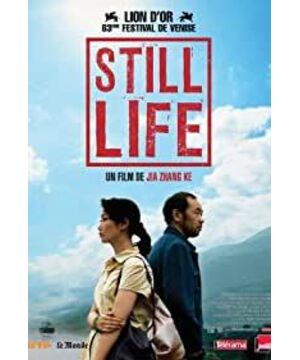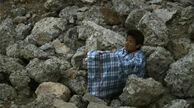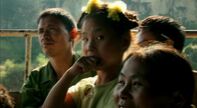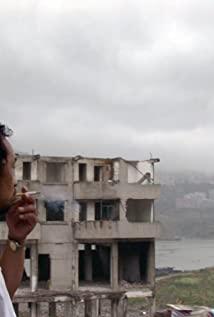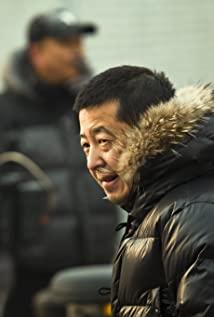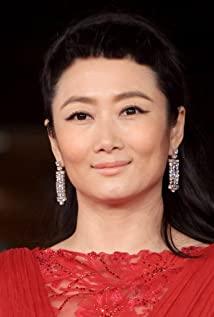The subject matter of this movie is not new, and stories of "searching" are everywhere in film history. But Jia Zhangke was smart enough to choose the background of the demolition of the "Three Gorges" to tell the story. If the film is not shot in the Three Gorges, such as in Jia's hometown and become a "good Fenyang man", it will work, but the amount of information will be much less. It is undeniable that the "Three Gorges" project not only has irreplaceable typicality in expressing the image of China in the midst of great changes, but the rich visual and social information provided as the background of the story also makes the film more effective. The moving details and state descriptions unique to Jia's films are embedded in the social change scene of the Three Gorges relocation. The blend of fiction and real records has doubled the shock of the film.
Secondly, choosing the theme of the "search" story is also very appropriate for expressing Jia Zhangke's consistent theme of "change". In "The Good Man in Three Gorges", various narrative elements unfold around changes. The hometown is disappearing, and the relationship between marriage, neighbors, relatives and friends is also mutating. The theme of this change or the theme of uncertainty is about Unchanging or deterministic pursuit. But in the end, the things found are also deteriorating. "Finding" itself becomes self-denial, or "finding" is a way of self-denial. Therefore, Shen Hong found her husband, but decided to end this love and marriage. However, Han Sanming's illegal marriage has the possibility of reunification because of the search.
Theme and meaning: Why do we like Jia Zhangke?
When many people mentioned the significance of Jia Zhangke's films, they often said that he had discovered the "county town". Take this as his pioneering work. And I feel that the greater value of Jia Zhangke's images is that he sets his sights on the people living on the fringe of society and the fringe of cities. In China, writing about low-level and marginal figures did not start with Jia Zhangke, but no one has used his concentrated eyes. The writing of the low-level characters in our movies often has to be refined and sublimated to their heroic character. If they are fortunate enough to be the protagonists of a film, they will definitely not be presented in the face of ordinary people. And more often, they only appear as a supporting role, passing by in front of the camera, with a unified and stylized expression, like a scene in the city. We have no understanding of their world. Although that world is at the foot of the prosperous city and behind the prosperous chapter, many people choose not to see, and those who see will accept the pain from the heart. Holding the coal, said nothing. No one said, we can't help but pay tribute to the one who said it. As a result, we saw that a thief like Xiaowu also gained dignity in Jia Zhangke's lens. The love and hatred of young people like Yin Ruijuan and Cui Mingliang, who are the most ordinary and even failed young people, can be shown on the screen.
Not only that, but Jia Zhangke presents their real life and state in a poetic way. This kind of poetry is not an unreal way, but refers to the fact that he has discovered the touching details that are left out by the bottom and marginal people. The lives of the people at the bottom have been aestheticized. In "The Good Man in Three Gorges", we can find many such details. For example, a group of bare-chested wall-smashing workers discussing the scenery on the renminbi, using the simplest language to describe the beauty of our daily carelessness. The poeticization of money may only be possible for the poor, while for the rich, money is nothing but capital. Another example is the scene of Han Sanming sharing a big white rabbit toffee with his ex-wife. Jia Zhangke wrote deeply about the romance in this state of material scarcity, making those who eat big fish and big meat tasteless, and just do nothing when they are idle. The so-called mainstream people who quarreled and divorced were ashamed. The low-level people and marginal people in Jia Zhangke's lens are no longer the kind of facial and stylized presentation. He restored their own richness, cunning, humorous, tender, violent, persevering, cowardly... To such marginalized people, Jia Zhangke gave poetic care and respect.
There was once an interview with Jia Zhangke called "Awkward Good Guy in the Golden Age". Alleged that he absolutely allowed "The Good Man in Three Gorges" to be released at the same time as "The Golden Armor in the City", demonstrating against the "blockbuster hegemony" with his actions. This makes me think that the reason why we like Jia Zhangke may be more that his persistence allows us to experience another cinematic possibility.
Evaluation of advantages and disadvantages:
(1): The more calm Jia Zhangke
From the "Hometown Trilogy" to "The World" and "The Good Man in Three Gorges", what we have seen in Jia Zhangke's movies is almost all the basic living conditions and feelings of people. It is also the emphasis on the basic sense of existence that makes Jia Zhangke's local writing an aesthetic possibility that transcends geographical restrictions. This is also the reason why his films can resonate so much internationally.
The basic living conditions and feelings of this kind of people are not piled up disorderly in Jia Zhangke's films. There is an inherent logic, that is, the changes of the times. How do you use images to express your personal experience in the changing times? What kind of rhythm? What kind of angle? Jia Zhangke has been exploring and has also experienced a process of gradual maturity. I want to illustrate this problem from the comparison between "The Platform" and "The Good Man in Three Gorges".
In Platform, it is full of Jia Zhangke's personal experience. The film does not have too many plot elements. It is more about the accumulation of some details, some states, some sounds, and some visual sights, which belong to the memories of the 1980s. The description of people’s living conditions and feelings certainly has its power to move people, but we should also note that the rhythm in "Platform" is chaotic. Those highly representative songs, voices, and political language use a kind of Jumps that are extremely disproportionate to the picture, instilling the concept of "time" through extremely high density, but these materials have no deeper entry into the plot except to create a specific atmosphere, and we cannot see social changes and the interaction between characters. , Can't even feel the specific changes in time. For those born in the 1960s and 1970s, they may be able to supplement the clues through their own experience. But for those who have not had similar experiences, the simple presentation of symbols is precisely what leads to a sense of alienation. Perhaps because Jia Zhangke has too many feelings about these ten years (also his growth years), we saw a man who has experienced many scenery along the way from "Platform". He wants to tell, a little haste, a little panic. . But the storyteller must be calm before he can impress others.
In "The Good Man in Three Gorges", what we feel is this kind of calm control. Jia Zhangke became calmer. For example, in the use of lenses, he is no longer obsessed with long shots, and also uses a lot of short-cut shots. For the first time, there are surreal elements in his movies. There are also many era symbols in this movie, but they are not filled in bluntly, but organically combined with the plot. For example, many old songs and popular songs are used in the film. "Mouse Loves Rice", "Two Butterflies", "Damp Heart", "Wine Just Sells Nothing", etc., are connected with the mood of the characters in the play, forming an echoing relationship and participating in the film Narrative. Based on the analysis of "Damp Heart", on the dance floor beside the Rainbow Bridge in the Three Gorges, people dance in the melody of "Damp Heart". The weather in the Three Gorges is wet, and Shen Hong's heart is also wet. The image of a marriage that is about to break. The humid and sultry weather made her restless, so she always held a mineral water bottle in her hand, constantly drinking water, constantly wiping sweat, and constantly wondering where her marriage would go. In "Station", all kinds of music are used more as a pure environmental sound.
(2) The more active protagonist
Why does "The Good Man in Three Gorges" move me more than the "Hometown Trilogy" and "The World", because these films are also written for the bottom and marginal characters of society. But in the previous movies, the protagonists are like dazed animals who have escaped from the various forms of sexual relations in human society. They are always in a passive and waiting state. We can't see what they want or desire more. It seems they don't have these.
In "The Good Man in Three Gorges", this situation has changed. The protagonist is no longer a passive model of helplessness and hopelessness. Faced with the hardship or embarrassment of life, both of them firmly choose dignity. At the end of the story, Han Sanming decides to return to Shanxi to work hard to earn 30,000 yuan to redeem his wife bought 16 years ago, while Shen Hong, played by Zhao Tao, tells her husband after a dance that he has someone else. She chose to end her relationship in this way, without crying or condemning. The heart may be sad, but what appears on the outside is a calm decision. In Jia Zhangke's own words, the protagonists in the film are active people. They have a heart of hope, and they all look for their happiness. Compared to the state of "my heart is waiting and always waiting", this may be a more worthy attitude towards life.
(3) One point may be demanding criticism
Jia Zhangke's unusualness lies in his artistic keenness in grasping the details of the living conditions of the low-level or marginal figures, and he constantly circulates in a soothing presentation of a grand era background. It is unspeakable, but powerful. We have seen that in Hollywood blockbusters and in most Chinese movies, the background of the times is often separated and blurred. They are not taken for the purpose of contemplating reality, they are only responsible for providing dreams and anesthesia. In Jia Zhangke's images, it is the changes of the times that shape the living conditions of the protagonists. This kind of era is not abstract, but is in progress, which we have experienced and are experiencing.
But perhaps it is precisely because of the complexity of expression of the shaping relationship that in Jia's works, we cannot clearly feel the confrontation and shaping relationship between human nature and social politics, morality, and ethics. The changes of the times are well presented as a background, but this is not enough. Not only do we need to be incited to tears, but we also need calmness and reflection after being moved. In "The Good Man in Three Gorges", Jia Zhangke vaguely mentioned the sharp conflicts of the times, but then the conversation changed. For example, the Three Gorges immigrants, the camera stayed on them many times, but did not try to penetrate their hearts. As a French film critic said: "The Good Man in Three Gorges" has always been observing this famous migration in an ambiguous and vague way..." It is
also the model of the "Era of Little People". In comparison, I prefer The expression in "Farewell My Concubine" uses individual encounters to project the times, and contains reflections on history. However, Jia Zhangke focuses on the results of the influence of the times on the individual, rather than the process. In the works of Director Jia, I hope to see that the fate of the protagonist is ups and downs in the era, rather than drifting away from it.
(4) Some problems in details
Jia Zhangke used some surreal elements in "The Good Man in Three Gorges", and the introduction of some surreal shots in the realistic movies sometimes did the finishing touch, such as the strange fish that appeared at the end of "Sweet Life", "Poisonous Sun" The fireballs that appeared several times in "All add points to the film and the theme. Jia Zhangke's use in this film is rough and somewhat artificial. For example, at 66 minutes of the film, after Zhao Tao finished drying his clothes and painted, the Three Gorges Immigration Memorial suddenly rose up like a rocket. I think it can be handled better here. The sudden rise of the building after the actors painted is really abrupt. If you can The illusion of being treated as a character is easier for the audience to accept, and the connection with the character and the plot can be closer. Another example is that at 82 minutes of the film, the camera follows Han Sanming’s eyes to three people playing games in costumes. Although it is interesting, I think the focus of performance is wrong. If the camera can return to Han Sanming. The body is fine. If you don’t go back to Han Sanming, then the camera should stay longer on the three singers. It’s better to have something to happen, otherwise it will make the audience feel that the filming is for the purpose of filming, rather than narrative or emotional. need.
In addition, it may be because the preparation time is too hasty. I think some of the film's dialogue has some flaws. For example, in the 90th minute, Han Sanming asked Mayao-mei's child where she was, and Mayao-mei replied in the "further south." This kind of literary accent did not seem to fit the identity of a peasant woman. Another example is that Shen Hong was stopped by a roadside child in the 46th minute. The child asked, "Sister, do you need a nanny? I am 16 years old." Shen Hong replied, "Oh, I'm only 16 years old." Turning to the subject, he said, "It's overcast." Then he left. This is a bit inconsistent with the logic of dialogue. It would be much more natural to add another sentence, "You are still too young." Of course, if you consider Shen Hong's state of confusion at the time, this kind of absent-minded answer is also possible.
Character and performance analysis:
A successful director is talented in choosing actors. In other words, a good movie cannot be separated from appropriate actors, just like Ang Lee chose Tang Wei to complete "Lust Caution." Jia Zhangke chose his cousin, Han Sanming, to ensure the authenticity of "The Good Man in Three Gorges".
Han Sanming often didn't say a word. He was short and walked slowly in the ruins with a dull and innocent expression. This sense of reality was not performed because he himself was a miner and a toiling public. When being deceived or treated rudely, he appeared mild and dull, but he was unwilling to waver at the goal he identified, his eyes were innocent but firm, and there were stubbornness in his eyes. This is also the survival wisdom of the people at the bottom.
Xiao Ma’s performance vividly presents the image of a street gangster. He is immersed in admiration and imitation of Chow Yun-fat. He learns from Chow Yun-fat in "The True Colors of Heroes" to light cigarettes with paper, and uses the episode of "Shanghai Beach" as an example. My own cell phone ringtone, following Chow Yun-fat’s words, "The current society is not suitable for us, because we are too nostalgic." This is the only comic character in "The Good Man in Three Gorges", and Jia Zhangke used him to increase the richness of the film. Add a touch of humor to the heavy background.
Starting from "Platform", Zhao Tao has become the queen heroine of Jia Zhangke's movies. After the experience of Yin Ruijuan in "Platform", Qiaoqiao in "Ren Xiaoyao", and Zhao Xiaotao in "The World", Zhao Tao has become a professional actor with a non-professional background. In "The Good Man in Three Gorges", Zhao Tao's performance is in place. The perseverance under pain is just right by her gloomy but uncontrollable expression. However, due to the limitation of the role, Zhao Tao in "The Good Man in Three Gorges" also failed to have an explosive display space, unlike Han Sanming and Xiao Ma.
Narrative structure and narrative skills Analysis of
narrative structure, "The Good Man in Three Gorges" adopts a plate structure, which is similar to Wang Jiawei's "Chongqing Forest". Zhao Tao's story is inserted in the middle of Han Sanming's story. The two have almost no intersection in the film, but they are the same in the theme, and they are both "seeking". A looking for a wife and daughter who hadn’t seen for 16 years traveled through the old city of Fengjie, and a husband who had been looking for two years of not going home and became increasingly cold. Walking in the new city of Fengjie, it was an illegal marriage that could retain feelings, and that began with free love. On the contrary, nothing can be left of her marriage. Formed a sharp contrast meaning.
From the narrative point of view, Director Jia chose to tell the story as two outsiders, rather than from the perspective of a person who grew up here. It was a new breakthrough for him, the Three Gorges Reservoir in the eyes of two outsiders. The area is also the sight of the Three Gorges Reservoir in the eyes of the audience (others). The audience is no longer just a spectator of the story of the people in the play, but has become a spectator of the changing society of China together with the people in the play. It is like being on the scene and empathizing.
In terms of audio-visual language analysis
lens, "The Good Man in Three Gorges", like Director Jia’s previous works, uses a lot of long shots, but there is an obvious change in that the long shots are also moving, and there are fewer fixed-position long shots. Comparing the beginning of "The Platform" with the beginning of "The Good Man in Three Gorges" can clearly see this change. The first shot of "Platform" shows a large group of people standing under a broken wall on the platform. They can only hear their noisy voices, but cannot see the expressions on their faces. When the film "The Good Man in Three Gorges" opens, the camera slowly moves past the passengers on a Yangtze River passenger ship. Their different expressions, movements, and voices give the audience a full view. Three minutes later, the camera fell on the protagonist Han Sanming sitting in the stern of the boat.
"The Good Man in Three Gorges" also has a lot of perspectives. The empty shots should be due to the weather. When you shoot the perspective, it is a gray and unrealistic view. Between these hazy mountains and rivers, it gives people a sense of boundlessness. The vast mountains, the vast water, and the magnificent background make the characters very small on the screen, often placed on the edge. And behind it are often dying cities and the surface of the Yangtze River where ships are drifting. In such an environment, it is inevitable to sigh from finite to infinite. The camera almost pushes people into the Yangtze River and the disappearing towns, but people don't have any "space" to choose. This also deepens the audience's sense of presence.
In the lens transfer, it looks rough and vigorous, and there is no design. This makes "The Good Man in Three Gorges" tell the story, but the story is not strong, because the audience will be interrupted at all times and drift out between the shots without cutscenes. . This abrupt editing method is consistent with Jia's style, perhaps as Jia Zhangke himself explained: "Because there is no smooth cut scene in reality!"
The emphasis on sound is also the usual style of Director Jia. The use of sound in "The Good Man in Three Gorges" is very clever. It is not recorded at the same time, but the ambient sound in the film is very specific and expressive. The sound engineer recorded a lot of Realistic sounds. After sampling the sound effects, they are rearranged like composing music. There are 5 or 6 paragraphs that are composed of sound effects, including the sound of smashing walls, the sound of waves, the sound of wind, the screaming of children, and the The gasps of the deep people combined like music.
The application of popular music has been analyzed in the advantages and disadvantages, so I won't be long-winded. One of the
analysis
of paragraphs, scenes and details : Analysis of opening shots: The opening shot of
"The Good Man in Three Gorges" is a long shot that lasts more than 3 minutes. At first, only the sound of waves passing by the boat was heard, and then blurry people appeared on the boat. , The camera gradually turns from virtual to real, slowly moving past the passengers on the boat, playing cards, talking and laughing, smoking, drinking... all kinds of faces are vivid and real. After tracing dozens of people with close-up shots, the camera slowly fell to Han Sanming sitting in the stern of the boat, his expression dignified with a military green travel bag in his arms. But it is not much different from other passengers. Then he wiped the sweat from his face, took off his jacket, turned his head, and looked forward. A viaduct appeared in the lens, straddling the mountains on both sides of the bank. This is how the story begins.
Interpretation: This is a commonly used method of Italian neorealism. Their stories often start from the crowds on the street. The camera silently watches the coming and noisy flow of people, depicting people’s daily life. After a few minutes, the camera slowly starts to move. It seems to fall on the protagonist inadvertently. There is nothing special about the protagonist, he is just a member of ordinary people, and will be drowned in the crowd at any time. This is what the directors want to emphasize. The story of the protagonist is the story of ordinary people. What happened to him could also happen to anyone in the crowd.
Second: Analysis of the closing paragraph:
Sanming and Lao Gui and other workers ate food and drink together. Sanming told the workers that he was going back tomorrow to make money, and the workers toasted to see him off. The old ghost asked Sanming if he could help find a way out. Sanming said that he could go to the black coal kiln. The workers heard that they could earn 200 yuan a day, which is much higher than the 40 or 50 yuan a day for demolishing the house, so they were willing to follow Sanming. Sanming said that going to the coal kiln is very dangerous, and life is in danger at any time. "A dozen people will die every year. I don't know if I can get it in the afternoon." Everyone was silent, smoking, eating vegetables, clinking glasses and drinking. Early the next morning, Sanming and his workers set off with their luggage. Han Sanming turned his head and found that on the one hand, the workers continued to beat the bricks with a sledgehammer, and on the other hand, a man with a balance pole was walking a tightrope between the two ruins. Then the song "Lin Chong Runs at Night" sounded. Sanming and his co-workers disappeared from the camera. End of the play.
Interpretation:
Among all the directors in China, Jia Zhangke is definitely the best in using the camera to show the undercurrents and undercurrents under calm. Too much oppression, too many natural and man-made disasters, and too much pressure to survive have made the people at the bottom seem numb. Jia Zhangke's shots have always been so calm and serene. When Xiaowu was handcuffed to a wire pole on the street, when Binbin took the hepatitis B notice to face the disillusionment of his military dream, when Sanming in "Platform" faced the coal mine’s life and death contract, when he was in "World" When Sanming came to deal with the funeral of the second girl, when Shen Hong decided to divorce her husband, and when the workers heard that going to the coal mine was actually working with their heads on their heads, everyone chose calm and silence without exception. But under the forbearance of the appearance, the inner magnificence may not be inferior to the hysterical hysterics at all. Just like the Three Gorges of the Yangtze River in the past, its steep beauty lies in the fact that it looks calm and the river is surging underneath. The calm mind of the characters under Jia Zhangke's lens is also turbulent, which requires us to empathize with one another with a compassionate heart. It is this kind of restraint and this kind of contrast that has caused the impact on our hearts and also created the appeal of the film.
The workers who demolished houses and Sanming who went back to Shanxi to dig for coal, like tightrope walkers, have the same uncertain future. The fate of the character and the uncertain future are all condensed in that scene. The background music is the lyric in the Sichuan opera "Lin Chong Night Run": "Look at the mountains and rivers in my hometown/but I see the white clouds and misty/Lao Xuantang is afraid of death/Oh, yeah, you have no support for your wife and children/Oh, wailing!/ Sighing for heroes/sighing, how can you get rid of heroic hatred?" God's will has never been high enough to ask, turning around and looking back, there is no hometown. In the era of no heroes, the era of the end of heroes, ordinary people are still running at night. Who knows where they will run, whether there is a hope ahead. In the boundless singing, a feeling of tragic and strong overflowed. We are in it, and we have mixed feelings.
Third: Detailed analysis of tobacco, alcohol, tea and sugar.
"Tobacco, Alcohol, Sugar and Tea" appeared on the bottom right of the screen as a subtitle card respectively, and was a symbol of Jia Zhangke's plotting paragraphs in "The Good Man in Three Gorges". These common objects in our daily lives are often overlooked. Just like the scenery on the back of the renminbi, we often ignore the existence of things that are closely related to us. In "The Good Man in Three Gorges", the camera has been fixed on these things many times, showing a deep level of enlightenment.
"Smoke", which first appeared in the film, was a tool used by Han Sanming to get close to the Mayao sister's family. When talking with Xiao Ma, the paper he took out with the address of Ma Yaomei was a mango cigarette case. He said that it was a good cigarette 16 years ago. The repeated actions of taking out cigarettes, lighting up cigarettes, and smoking in the film all reflect his complicated psychological activities. This mu Na silent Shanxi man, the fluctuating rising smoke ring that spit out was his silent language.
"Wine", Han Sanming used to get close to Mayao sister's family again. After drinking, Han Sanming formed a brotherhood with Xiao Ma. During the drinking, everyone made a helpless choice—taking life as a bet and went to Shanxi to dig coal with Han Sanming.
Tobacco and alcohol seem to make people closer, and also make people more bold and courageous. The functions of sugar and tea are different from tobacco and alcohol.
"Sugar" is a symbol of happiness in life, especially in a state of material scarcity. This thing that most reminds people of happiness, in the film let us see the cruelty of life. The first sugar-related scene was when Sanming went to work and met Brother Xiao Ma carrying a bag of white rabbit toffee. He handed Sanming a candy while telling him, "Brother, let’s go to Yunyang to settle down today." One person, each boss gives 50 yuan." With an exaggerated tone, it seems that 50 yuan is a huge sum of money. Then he sweetened those brothers one by one. Afterwards, they chewed the candies to settle the situation. And it was these 50 dollars that directly caused Brother Xiao Ma to lose his life, and the sugar played a role in contrast. The second sugar-related scene is that Han Sanming and Mayaomei share a single piece of candy and eat them squatting. This kind of romance in a state of material scarcity is sad and embarrassing. On the one hand, this candy reveals Mayaomei's sense of dependence and care for Han Sanming, and also contains Han Sanming's promise and sense of responsibility to Mayaomei. In order to reunite his family, he decided to go back to Shanxi and continue to go to the black coal mine to redeem her. Sixteen years later, they are no longer young, they understand the weight of their lives, and they understand that their original decision may be wrong. So I chose to renew the fate of 16 years ago. There is a kind of sorrow of the poor, but it also has the resilience and wisdom of the lower class. Although poverty did not leave them much choice in their lives, they are facing and bearing it resolutely.
"Tea" appeared in the passage of Shen Hong seeking her husband. Shen Hong found a bag of Wushan Yunwu tea in her husband's old objects, and the packaging was as bright as ever. Then, on the boat, when Shen Hong drank the last drop of water in the bottle, he thought of Guo Bin and the misty and misty tea, like illusory love. She poured the tea into the cup, but did not flush the water to drink in the end. After two years, tea may have deteriorated, but isn't it the same for people? Here, the role of tea is different from the first three. It is a symbol of emotion. And it is more aimed at the middle class, people with fixed incomes like Guo Bin and Shen Hong. For the people at the bottom, there may not be a demand for tea, a cup of plain water is enough. For Mayao Mei, life only left her with room to live, while for Shen Hong, life left her with a lot of choice, and her desires were much more. Love is gone, and she can choose to end. marriage. Mai Yao failed to obtain this right, and she was bought and sold. But we can't say that Shen Hong suffers less than Mayao sister, and will be happier than her. Jia Zhangke once said: "I think the changes in China are over, the biggest change is over, what is left is that everyone has to face reality and make a decision." Everyone faces a different reality, and everyone has to do it. The decision is different, and the ups and downs in their hearts cannot be measured. But the same is the courage and determination that we all need to face, and it is inevitable.
References:
Jia Zhangke, Wang Hui, Cui Weiping: "The Good Man in Three Gorges": Hometown, Changes and Jia Zhangke's Realism, "Reading", Issue 2, 2007
Yang Wenhuo (compilation): "The Good Man in Three Gorges" Creation Talking, "Journal of Beijing Film Academy", 2007 No. 2
Wu Jing and Wang Zhen (compilation): "Stay on Oneself in the Trend of Industrialization-Jia Zhangke's Speech at Hong Kong Baptist University", "Film Art", 2007 Year 1
Xu Bai Ge: "Golden age of embarrassment good - interview with Jia Zhangke", "China Youth Daily • freezing Point", 9th Edition, 2007 January 10
secondary charge (finishing): "attracted me not gold luster , But the dignity of a good person-Jia Zhangke's Q&A in Shanghai, "New Movies", Issue 1, 2007
View more about Still Life reviews


